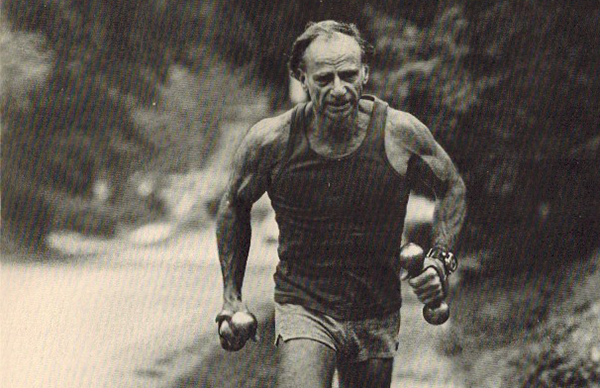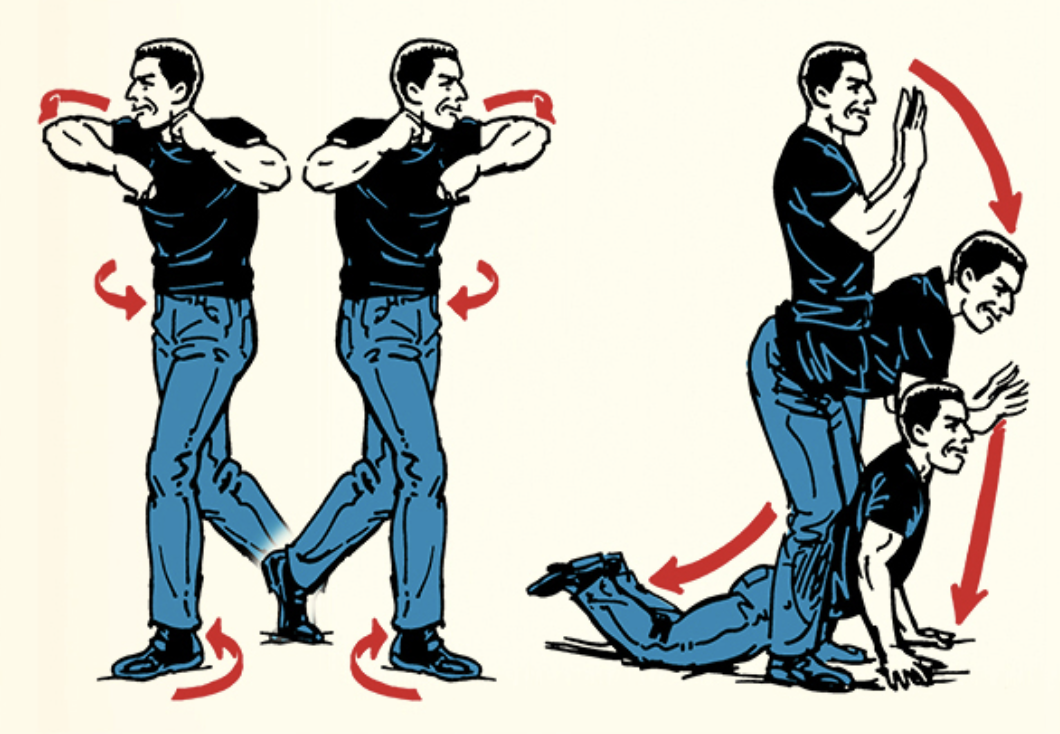
For most of human history, work has been a physically demanding activity. Our cavemen ancestors chased down mastodons and hurled spears into their tough, but tasty flesh, American homesteaders tamed the wilderness into productive farms with nothing but grit and sweat, and just 60 years ago, the majority of men in America flexed their muscles on factory floors or construction sites.
Fast-forward to today.
Instead of feeding ourselves by the sweat of our brows, most of us just slouch in a chair all day in a climate-controlled building while we push buttons and send documents through the ether. And the sitting doesn’t end after work. When we get home, we plop down in front of the TV to watch reality shows of men performing the kind of virile, physical, and often dirty work we fantasize about doing while answering emails in our cubicle.
Man’s transition from callused-handed, blue-collared laborer to soft-handed, white-collared desk jockey has done a number on us physically and mentally. Not only have our desk jobs made us weak, flabby, and stiff, sedentary work is sapping the very hormone that makes a man a man: testosterone.
What’s more, all this sitting is slowly eating away at our life meters. One study showed that men who sit for more than six hours of their leisure time each day had a 20% higher death rate than those who sat for three hours or less. For the desk jockey, death comes wrapped in a Successories Poster and waving a USB drive.
“Ah-ha!” you say. “I work out out like a beast in the gym every day and have a physique that rivals Eugen Sandow’s. My hour-long, herculean effort counteracts all the sitting and slouching I do at work!”
Sorry to break it to you Mac, but your visits to the gym aren’t doing much to mitigate the damage that accumulates from all that desk jockeying.
Studies have shown that consistent, vigorous workouts don’t do much to offset the damage we do to our bodies by sitting down all day at our cushy Dilbert-esque jobs.
So what’s a modern man to do?
If you want to live to see your future grandkids and maintain your manly physique and sense of well-being, you’re going to need to stay active throughout the day.
That can be tough when you’re chained to a desk filling out TPS reports or attending unproductive brainstorming sessions on how to build more “synergy.” But with a little creativity, and a bit of gusto (along with a thick skin about what other people think of you), you can easily find ways to sneak some exercise into your work routine and flip the Physicality Switch of Manliness. Below we offer a few simple suggestions on how to stay active all day even if you’re a white-collared desk jockey. Incorporate them into your schedule and you’ll find yourself with hips as limber as an Olympic powerlifter and more energy than you had as a teenager.
1. Make Getting to Your Office a Challenge
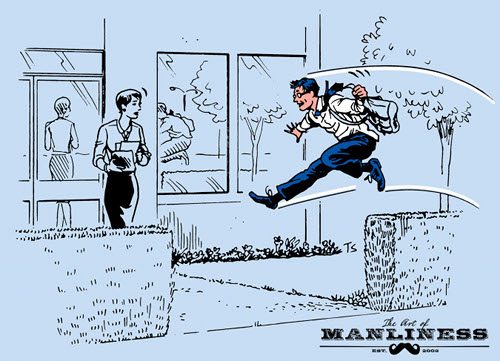
Look for ways to make getting to work and into the corporate cave a challenge. Biking to work is of course ideal. If you have to drive, park at the far end of the lot so you have to walk further to the building, carry a giant Saddleback Briefcase (those suckers are heavy) filled with your laptop and small boulders, and hurdle over small hedges as you make your way to the door. For extra challenge, throw in some parkour and scale the walls like AoM reader Jeremiah Jacques:
2. Take the Stairs. While You’re At It, Run Up Them
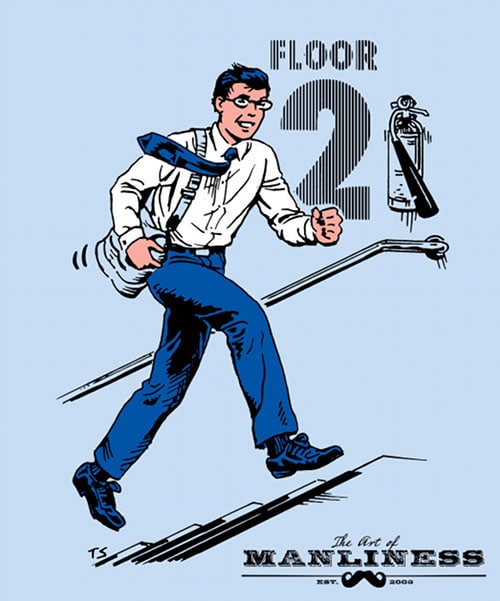
Instead of using the elevator to move between floors, take the stairs. Start off walking, but work your way up to a full out sprint. Don’t worry about looking like a crazy person. Most stairs in office buildings are hidden away as fire escapes and hardly anyone uses them. Once you reach your floor, pause outside the door to catch your breath, straighten your tie, and mop your forehead with a handkerchief. You just literally leveled up on your high intensity training!
3. Get a Standing Desk
One of the best things you can do to mitigate the health-sapping effects of your desk jockey job is to get a standing desk. The drain on your weight and health, including hip and back stiffness and pain, that comes from sitting down all day will disappear. While you might not be able to convince your boss to spring for an expensive hydraulic-powered standing desk (though I’d at least try lobbying him for it), you can jerry-rig your own standing desk in various ways (search Flickr.com for “standing desk” for ideas).
To learn more about the benefits of standing to work (and its manly history), check out this article from the archives on standing desks.
4. Maintain Good Posture Throughout the Day
If you want to avoid the Quasimodo shoulder slump that seems prevalent among desk jockeys, make the effort to practice good posture throughout the day. Yes, it’s hard and tiring at first, but the struggle is well worth it. Practicing good posture while sitting and standing can reduce tension in your neck, shoulders, and back, improve organ function, and strengthen your all-important core.
Check out this classic article for instructions on how to improve your posture.
5. Do 10 Push-Ups and 10 Squats Every Time You Take a Bathroom/Coffee Break
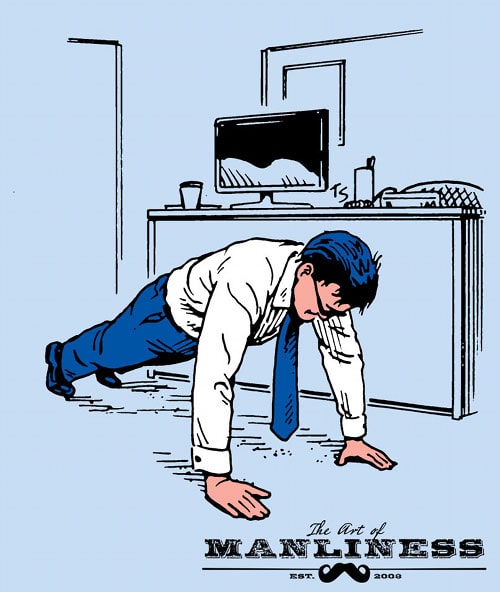
When I clerked at a law firm here in town, my office sat adjacent to that of the firm’s sole surviving founding partner. He was one of the coolest old guys I’ve ever met. He was sort of like Teddy Roosevelt in a lot of ways. The walls of his office were covered with stuffed and mounted wildlife from his many hunts; dropping memos off in his office was like stepping into the Museum of Natural History. Despite being nearly 80 years old, this old partner was spry as a young buck. I asked him his secret to his youthful vigor at lunch one day, and this is what he said:
“Maintain a sense of humor. You need it in the legal business. And do lots of push-ups while you’re at work. I always do ten anytime I get up from my chair.”
And he did.
Every now and then, when I walked by his office, I’d see a short, bald old man on the floor, cranking out push-ups in his waistcoat.
That little old man inspired me. I started a similar routine that summer at the law firm. Anytime I got up from my chair, I’d do 10 push-ups. I also added 10 bodyweight squats for good measure. The result? I felt more energized and less stiff. More importantly, I started losing some of the summer intern lunch chub that I had gained over the summer.
Stay active throughout the day by incorporating a similar routine.
6. Get Up and Walk Outside for 15 Minutes Every 45 Minutes
I’ve noticed that I’m more productive when I work in shorter increments and take frequent, small breaks throughout the day than if I slog through a project in a single sitting. Taking frequent breaks isn’t only good for your brain, it can also be good for your body, too. To keep your brain and body running on all six cylinders, use the Pomodoro Technique when you’re working.
Set a timer for 45 minutes and work non-stop. When the 45 minutes are up, take a break for 15. Instead of surfing the web or chatting with Mark in HR, go outside and take a leisurely 15 minute stroll (unless of course you have a job where your boss expects you to be at your desk every minute). Plain old walking provides a surprising amount of health and mind benefits such as lowering our resting blood pressure, reducing obesity, and improving our working memory.
Doing your walk outside will also help you activate the Nature Switch of Manliness, which will reduce stress, keep you mentally sharp, and even boost your testosterone.
You can even make your walks productive by holding meetings with co-workers as you stroll. There’s something about walking and talking that gets the creative juices flowing. Steve Jobs was famous for his walking meetings. Instead of sitting at a table in a stuffy conference room, he’d ask the person he wanted to meet with to take a walk with him outside. Co-workers would go on to say that those “walking meetings” were some of the most productive meetings they ever experienced. Jobs was likely inspired by Aristotle’s peripatetic teaching. Instead of standing in front of a large group of students to lecture, Aristotle preferred to walk and talk to his students.
If it worked for Jobs and Aristotle, maybe it will work for you. Even if you don’t come up with a breakthrough business idea during your walking meeting, you’re at least staying active.
7. Perform 15 Dips When Leaving for and Returning from Lunch
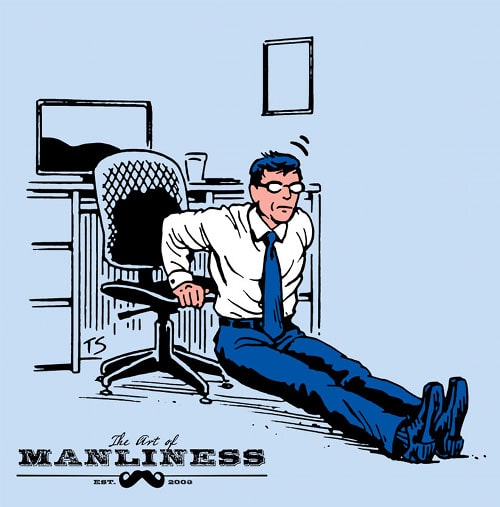
Work those tri’s before and after lunch by cranking out a quick set of 15 dips when you leave for and return from lunch. Just place your hands on your chair and walk your feet out in front of you. I like to keep my legs stretched straight out while I perform the dips. Lower yourself until your arms form a 90 degree angle and then press up. Repeat 14 more times.
8. Perform 30-Second Grok Squats Throughout the Day
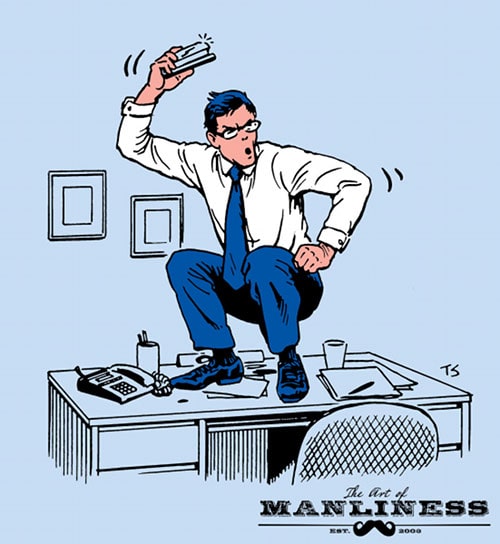
Mark Sisson from Mark’s Daily Apple introduced me to one of the best exercises to help alleviate the back, groin, and hip tightness that comes from sitting in a chair all day: the Grok Squat.
Also known as the Asian Squat or Indigenous Person Squat, the Grok Squat is a sitting position that you find in cultures that don’t have sofas or chairs like we do in the West. It’s something you did as a tot, and have forgotten; our almost two-year-old son, Gus, gets down into some really amazing Grok Squats all the time.
The Grok Squat is very similar to a catcher’s stance in baseball. Simply squat down until your butt touches your ankles. Keep your heels firmly on the ground and back straight. Hold that position for 30 seconds to a minute. You should feel your hamstrings, quads, Achilles tendons, lower back, and groin gently stretching. If you’re super stiff, it may take a few days of practice to sink into a full-on Grok Squat. Keep at it. Your back and hips will thank you.
To avoid the stiffness that comes from sitting and standing all day, incorporate several short Grok squats into your daily routine. A great time to do them is right after your 15 minute long walks. Before you resume working, simply crouch into a Grok squat and hold it for 30 seconds to a minute. For added effect, do the Grok Squat on top of your desk while holding a stapler above your head like that monkey hoisting the bone at the beginning of 2001: A Space Odyssey.
Illustrations by Ted Slampyak
Tags: Exercises



